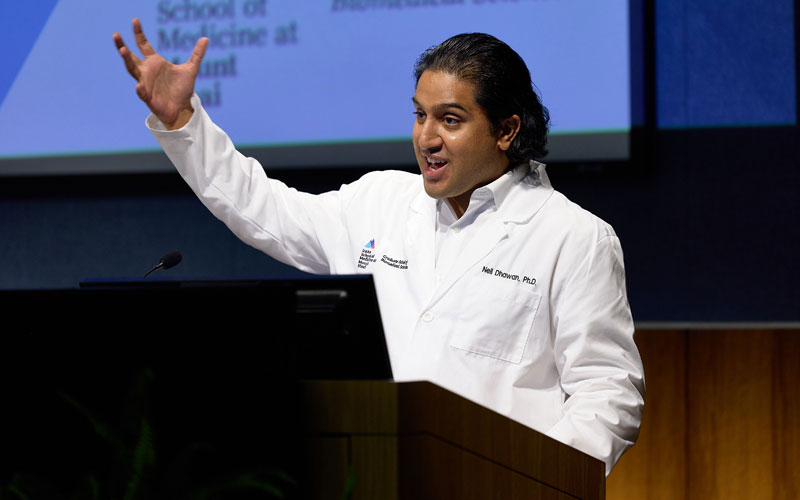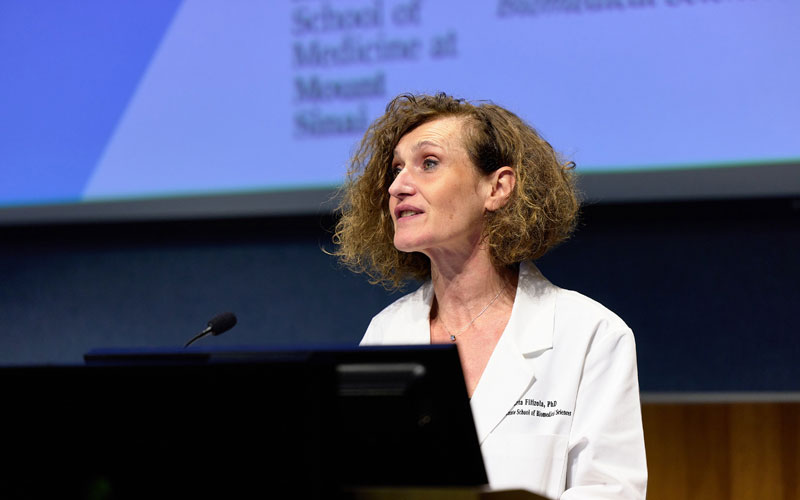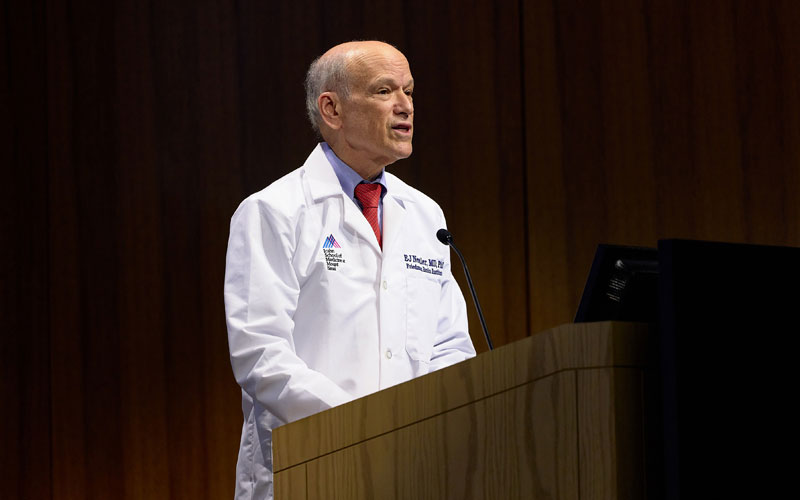
“Persistence, resilience in the face of criticism, combined with a willingness to listen and adapt, is the thing that can most define your success,” says Neil Dhawan, PhD.
Neil Dhawan, PhD, had a story to share with the audience of new PhD and MD-PhD students who attended the 2024 Lab Coat ceremony at the Icahn School of Medicine at Mount Sinai Graduate School Biomedical Sciences. He was on familiar ground: Dr. Dhawan received both a master of science and PhD degree in biomedical sciences at Mount Sinai, and his story was one of encouragement and success.
Dr. Dhawan, whose training area was in cancer biology, is a co-founder of two companies, starting with Dual Therapeutics LLC, a venture-backed biotechnology company that he established as a student, where he helped to develop the lead drug program, small molecule agonists of PP2A, which led to a collaboration deal with Bristol Myers Squibb that was valued at up to $225 million.
He is also Co-founder, Chief Scientific Officer, and Head of Research and Development at Totus Medicines, where he focuses on combining small molecule design, structural biology, genetics, biochemistry, and cell biology to create new classes of drugs to target untreatable diseases. “Over the past three years, we have raised more than $100 million, we advanced our first drug targeting one of the most common oncogenes in cancer, and we presented our first clinical data showing tumor responses in late stage cancer patients,” he said.
“When I first started at Mount Sinai, the idea of discovering and developing a drug to the clinic seemed almost impossible. I always would hear that it could take a lifetime and hundreds of millions of dollars. There were even skeptics who doubted the value of my work because I was just starting out. When I set out to develop my drug idea, most people told me ‘Most biotechs fail,’ or, ‘Do you think you can compete with Pfizer?,’ or ‘Why would investors give you money?’”
And, he gave this advice: “So, what should you do when you feel frustrated and things are confusing? I encourage you to put your head down and do the work—read every paper, read through patents, study the leaders in the field, and most importantly go and speak to those leaders who are a floor or hallway away at Mount Sinai…Persistence, resilience in the face of criticism, combined with a willingness to listen and adapt, is the thing that can most define your success.”

The Lab Coat ceremony symbolically represents the beginning of the students’ academic research and training at Mount Sinai and reinforces the responsibility and professionalism they will cultivate and uphold as they pursue their degrees.
Marta Filizola, PhD, Dean of the Graduate School of Biomedical Sciences, opened the ceremony. “Our PhD programs in biomedical sciences, clinical research, and neuroscience offer rigorous, collaborative training that equips our students to lead the next generation of scientific and medical advances,” she said. “These programs are essential in addressing complex challenges and finding solutions grounded in data and robust statistical analysis.”
Dr. Filizola is also the Sharon & Frederick A. Klingenstein/Nathan G. Kase, MD Professor of Pharmacological Sciences, Professor of Neuroscience, and Professor of Artificial Intelligence and Human Health.

Marta Filizola, PhD, Dean of the Graduate School of Biomedical Sciences
“We are branching out into new research frontiers, leveraging artificial intelligence and other technologies in medicine to improve both patient health and quality of life,” she said. “Our students are integral to this process, bringing diverse perspectives and experiences that drive innovation in both basic and translational research.”
Eric J. Nestler, MD, PhD, Dean for Academic Affairs at the Icahn School of Medicine at Mount Sinai, welcomed the students, faculty, and guests. “The core process of science is the scientific method, which describes a systematic process—to quote from the dictionary, ‘for acquiring knowledge that involves making observations, collecting data, and testing hypotheses.’ We can all appreciate the paramount significance of the integrity of science,” he said. Dr. Nestler is also Director of The Friedman Brain Institute, Nash Family Professor of Neuroscience, and Chief Scientific Officer of the Mount Sinai Health System.

Eric J. Nestler, MD, PhD, Dean for Academic Affairs
“Science and the scientific method, with its embrace of empiricism and causality, represent the proud tradition that created all of us, and that each of us in turn has the responsibility to promote, protect, and defend,” he said. “By earning a PhD degree, you are the new generation upon whom society will depend to continue this tradition, with the goal of further improving the health and lives of its citizens.”
Why an MD-PhD and PhD degree? Watch these video interviews with three students to learn more about the programs—and their passions.
Nicole Hirsh is a third-year student in the MD-PhD program studying Cancer Immunology.

